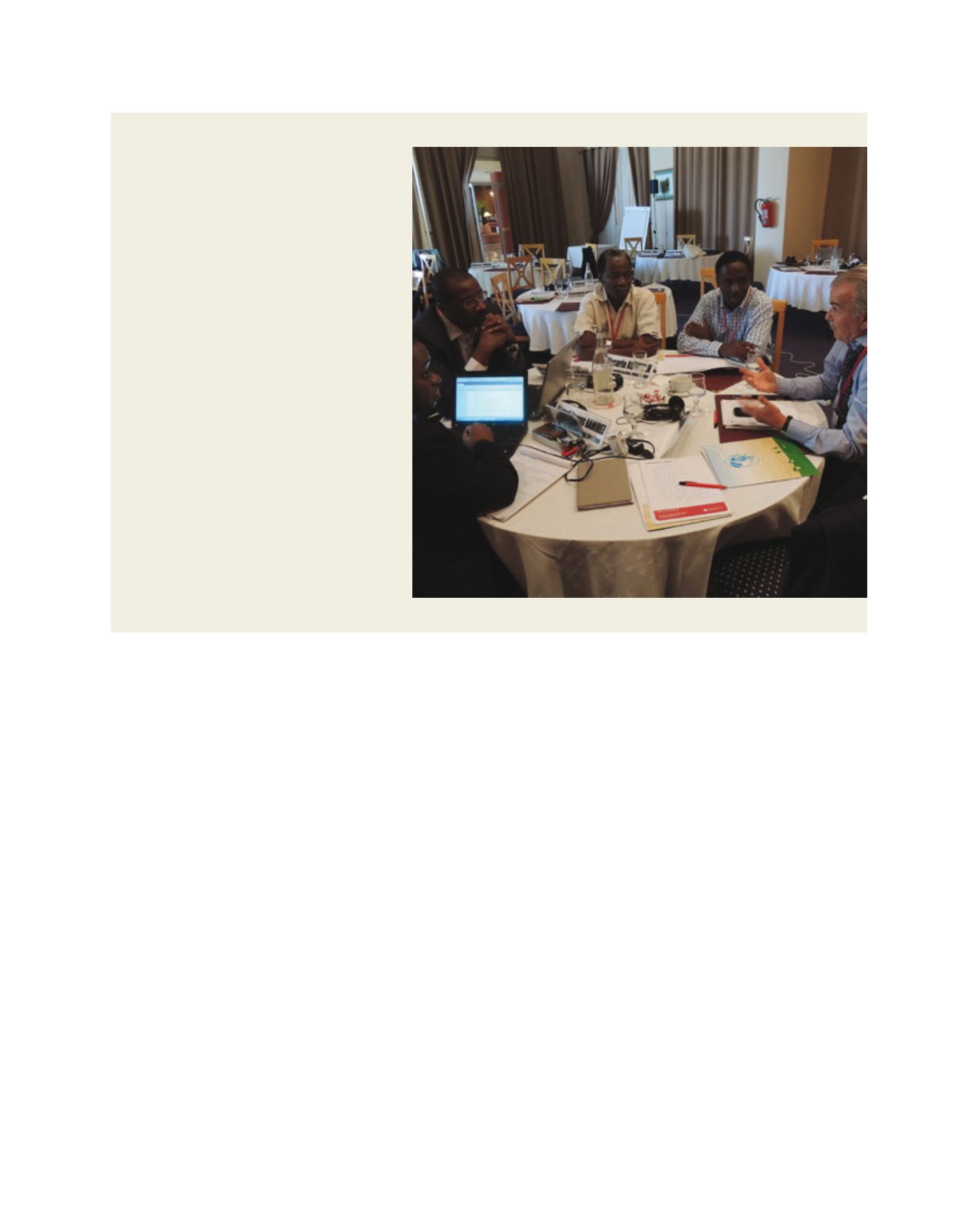

[
] 161
F
inancing
C
ooperation
on aid effectiveness, AfDB is playing an increasingly prominent role
in donor coordination activities and in joint sector operations such
as sector reviews, especially in those countries where a sector-wide
approach (SWAp) is being implemented.
AfDB values cooperation with non-governmental organizations
(NGOs) in view of their positive impacts on project development
and implementation. For example, on the Kibera Water Supply
and Sanitation Programme in Kenya, NGOs with expertise in
slum areas are engaged in capacity building and coordination of
the construction of water and sewer lines and ablution blocks. The
NGOs’ intervention has enabled the bank and the water utility to
better address a number of social issues including the resettlement
of displaced persons. Cooperation with NGOs is also common on
rural water supply and sanitation projects financed by AfDB, as they
are often involved in working with communities on project planning
and implementation.
Cooperation through trust funds
Trust funds provide an additional technical and financial instrument
for cooperation and support, complementing AfDB’s traditional
lending activities. The Water and Sanitation Department (OWAS)
manages three trust funds, each contributing in different ways
towards the bank’s objectives.
The Multi Donor Water Partnership Programme (MDWPP), estab-
lished in 2002, has been supported by three donors (Canada, Denmark
and the Netherlands) and has the broad objective of operationalizing
AfDB’s IWRM policy within the bank and in the RMCs. The MDWPP
supports the work of several sector departments includ-
ing OWAS, Agriculture and Agribusiness, NEPAD and
Regional Integration, and Energy, Environment and
Climate Change (ONEC). The MDWPP has contrib-
uted significantly towards strengthening AfDB’s IWRM
capacity, building awareness of IWRM issues within and
outside the bank, improving knowledge on IWRM issues
and facilitating sector dialogue.
As part of its role in leveraging funds for Africa’s water
sector, AfDB supported AMCOW to establish the African
Water Facility (AWF) in 2004. AWF represents a major
cooperation effort between 15 bilateral donors, multi-
lateral financial institutions, foundations and African
governments (Algeria, Australia, Austria, the Bill and
Melinda Gates Foundation, Burkina Faso, Canada,
Denmark, the European Union, France, Norway, Senegal,
Spain, Sweden, the United Kingdom, and AfDB). It is
hosted and managed by the bank. AWF mainly supports
project preparation designed to attract follow-up invest-
ment. By the end of 2012 it had attracted EUR20 for
every euro invested, bringing the total financing lever-
aged to EUR714 million.
AWF is implementing much of AfDB’s work in
transboundary water resources management (TWRM)
across the continent by promoting the development
of cooperative legislative frameworks for effective
TWRM, strengthening inter-basin and intra-basin
Collaboration with the World Bank
Collaboration between AfDB, the World Bank and WSP
was formalized in 2006 and led to a WSP liaison office
being opened at AfDB headquarters in Tunis in 2007
for a three-year period. Collaboration during this period
included the following.
On knowledge sharing and capacity building, joint
workshops were held and joint publications produced.
At the operational level, there were joint supervision
missions with appraisals in eight countries and mutual
contributions to project preparation. There were also 12
joint sector reviews, joint financing of budgetary reviews
in three countries and co-financing of water sector
projects in seven countries.
AfricaSan 2008 led to a joint review of the sanitation
and hygiene status in 32 countries and the eThekwini
Declaration with its call for country action plans to
address the sanitation MDG. The first Africa Water Week
resulted in outputs endorsed by the African Union and
G8 summits. AfDB and WSP contributed to the launch of
the Pan-African Monitoring and Evaluation Assessment
in Tunis in 2006. Country Status Overviews were
carried out in 16 countries and a Sector Information
Management Workshop was held in Nairobi in 2007.
Credit rating assessments were produced for seven
African utilities with a view to contributing towards
increased operational efficiency and preparing water
utilities for accessing market finance. WSP and AWF
also supported the setting up of the Water Operators
Partnership – Africa.
AfDB is continuing its cooperation with the World
Bank on WSS issues. Current plans include joint
financing of the Port Harcourt Urban Water Supply
and Sanitation Project in Nigeria, joint support for a
water sector SWAp in Ethiopia and a joint programme
evaluation mission in Tanzania.
A working session between AfDB and WSP in Tunis
Image: AfDB


















